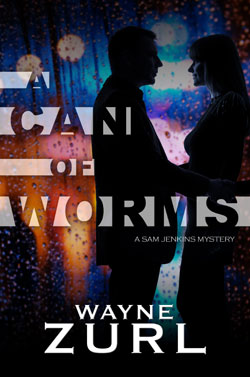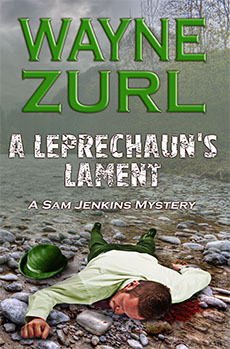“Sam, I’ve got a woman on the line.” Bettye sighed before continuing. “You really need to talk with her.”
She transferred the call, and I answered my phone.
“Chief,” the woman said, “do you normally hire rapists to be po-leece-men in Prospect?
I’m glad no one was watching me. I felt my eyes pop open, and I’m sure my jaw dropped. I knew exactly who she was talking about.
“That’s a disturbing question, ma’am. Would you explain a little more?”
“I’ll explain a lot more. Will you do somethin’ about it?”
I had the option to tap dance and keep a disillusioned citizen on the line or take offense at someone thinking I might not be the best police chief Prospect ever had. Compromise is everything.
“Ma’am, I’ve believed in something important ever since I got sworn in as a police officer a long time ago,” I said. “I think a cop’s reputation is one of the most important things he or she has. If what you say is true, my reputation and that of Prospect PD are in jeopardy. You bet I’ll do something about it.”
There was a long moment of silence.
“You’ll listen ta me then?”
I thought I hooked her attention. “Of course I will.”
“My daughter was raped by a man y’all hired.”
I remembered back all those months to when I met Dallas and thought, why me?
I gave the caller a few options. “Would you like to do this over the phone or at the police station? Or would you like me to come to your home?”
There was another moment of silence.
Then, “On the phone is aw rot fer now.”
“Sure, that’s okay—for now. Will you tell me your name?”
“I guess ya need ta know that, don’t ya?”
“It would help. I’ll need to know your daughter’s name, too.”
“My name’s Asher—Jodelle Asher.”
“Thanks, Mrs. Asher. If you didn’t hear Sergeant Lambert or me say so before, I’m Sam Jenkins, the police chief in Prospect.”
“They’s a bunch o’ Jenkinses here in Blount County. You from a local family?”
“No, ma’am. I’m from New York.”
“Ya didn’t sound like you’s from Tennessee.”
“No, I guess I don’t, do I?” I knew the answer to my next question, but I asked anyway. “Mrs. Asher, which policeman are we talking about?”
“That Finchum boy, Dallas. He’s the one raped my daughter, Dorie.”
I remembered my reaction when Dallas first told me about an incident that both the UT campus police and Chattanooga detectives summarily dismissed as unfounded. I worried about it then. Now it felt like something was waiting to come back and bite me in the posterior.
“When did this happen?” I asked.
“More’n three year ago, but that don’t make it no less awful, does it?”
I silently blew out a little air. “No, ma’am. I can’t think how rape can ever be forgotten or looked at as anything but awful.”
Bettye Lambert walked into my office and sat in one of the guest chairs in front of my desk. She held a sheet of paper. Her little granny glasses rested low on her nose. She reached forward and handed me a Tennessee Department of Safety printout for Jodelle Asher, showing her personal information, address and driving record. Bettye had listened in on the conversation, then checked on our complainant
“Dorie was in school at UT, Chattanooga,” Jodelle Asher said. “So was Dallas, but I suppose you already know ‘bout him.” She waited a few seconds for a response, but I didn’t offer one. “They knew each other ever since high school.” She pronounced the last words hi-skoo. “They’s seniors in the college school when the rape happened. Dallas had asked her out a couple times, then one night he ups and attacks her. I believe my daughter, Mr. Jenkins. If she says she was raped, then she was raped.”
I had already heard Finchum’s account of what Mrs. Asher just said and the rest of what she was about to tell me, but I asked a few basic questions and allowed her to talk so I’d have two stories to compare.
“Did your daughter report the rape?”
“Yes, sir, she shore did to the college po-leece.”
Bettye took off her glasses and sat there swinging them back and forth listening to the one-sided conversation.
“Campus police usually don’t investigate serious crimes,” I said. “Did they refer it to the local police or the sheriff’s office down there?”
“They did. Hamilton County Sheriff. Little good that did.”
“What did the Hamilton County detectives tell your daughter?”
I looked up at Bettye, waiting for Mrs. Asher’s explanation. Occasionally she wears a hint of green eye shadow. It goes well with her blonde hair and hazel eyes—matches her uniform pants, too.
“A lotta noise is all. They called her a couple o’ days after it happened. Then he, this detective, told her how hard it was to prove rape and how tough a lawyer would make it fer her when she got ta court. That man made her feel like she’d be the one on trial, ‘stead o’ Dallas.”
The story began differing from what Dallas told me.
“Did your daughter report this immediately after it happened?”
“Yes, sir, she did. Same night.”
“And a couple of days later a detective tried to kiss this off?”
“Yes, sir.”
“Did Dorie see a doctor?”
“Yes, sir. Same night. A woman from the college po-leece took her.”
“Were there any witnesses? Did anyone see her right after she was raped? A roommate maybe?”
“Yes, sir, Dorie had a roommate. Nice girl, name o’ Laura Jean Hensley.”
I wondered how much of this behind the scenes action Dallas Finchum knew.
I looked at Bettye again. She tilted her head as if to say, “This sounds like a fine can of worms you’ve picked up, Sammy.”
“Mrs. Asher, I plan to investigate this, but I’ll need to meet your daughter and speak with Laura Hensley as well. When do you think I can do that?”
“Dorie don’t much like talkin’ about the rape. Bad memories an’ all. Laura, she lives in Knoxville. Works there, too.”
“I believe all you’re telling me, Mrs. Asher, but I can’t arrest Dallas Finchum or fire him for what he did based on our telephone conversation. I need to see Dorie, get a statement from her, see Laura, record what she saw and then find out why the people in Chattanooga didn’t do more.”
“I unnerstand.”
“Before we hired Dallas, my investigator and I listened to his side of this date rape story. A detective named Gallagher spoke with your daughter, and she refused to make a statement. She said the incident was over, and she wanted to get on with her life. She more or less reaffirmed that she decided not to press charges.”
“I know Dorie was terrible upset over the whole affair. I can pitcher her sayin’ that. That mean nothin’ can be done now?”
“No, it doesn’t.”
“Good.”
“May I speak with Dorie now, or will you have her call me?”
“I’ll ask her. Don’t know if she’ll talk with ya though. She might not’ve changed her mind.”
I began to feel a serious frustration.
“I promise you, Mrs. Asher, if I can do something to help your daughter, I will. But it’s important for me to speak with her…and with Laura Hensley. They have to cooperate.”
“I’ll have ta call ya back.”
“Okay. Do you live in Prospect?” I asked, wondering if the driver’s license information was up to date.
“No.”
“Where do you live?”
A little more silence.
“Mrs. Asher?”
“We live in Maryville.” Like most local people, she pronounced it Murr-vull. “East end o’ Murr-vull, not fer from Walland.”
“Tell Dorie I’ll meet her anywhere she wants. Here at Prospect PD, at a public place, anywhere—doesn’t matter.”
“I hear ya.”
“Can I call you back to find out what she says?”
“I’ll call you.”
“When? Tomorrow?”
“I ‘spect so.”
“Alright then. Good luck with Dorie. And, Mrs. Asher, I promise I’ll help you.”
“Uh-huh. I’ll call ag’in.”
She hung up. I needed a drink.








 Against his better judgment, Police Chief Sam Jenkins hires Dallas Finchum, nephew of two corrupt politicians.
Against his better judgment, Police Chief Sam Jenkins hires Dallas Finchum, nephew of two corrupt politicians.




